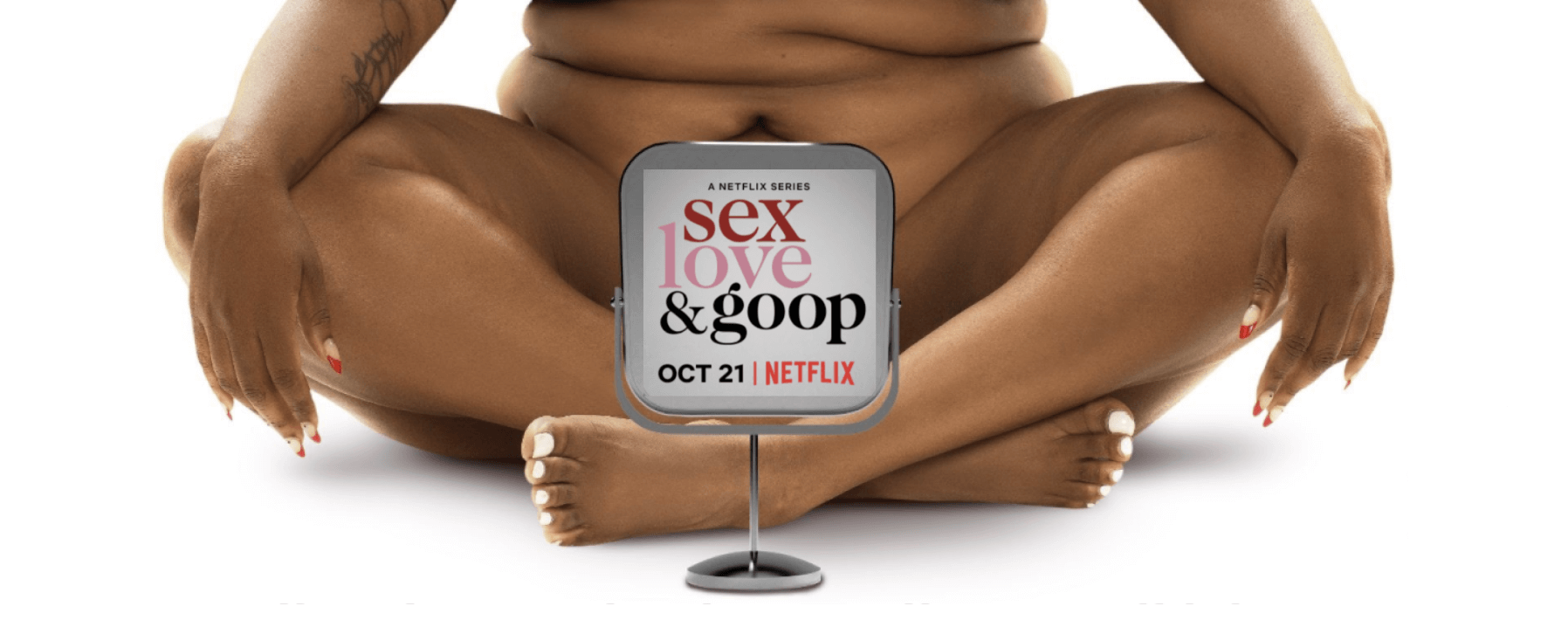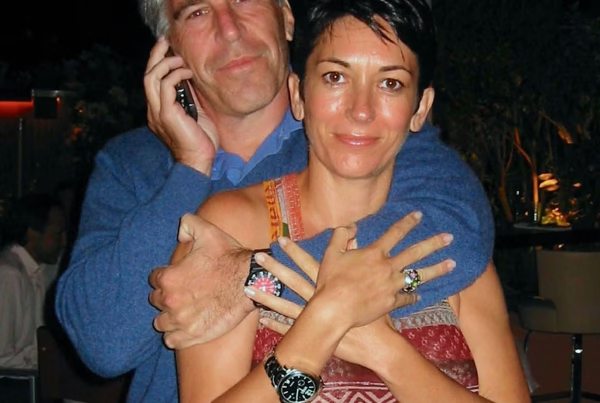Who cries after watching a Netflix show about sex? Well, that would be anyone who understands that it’s not just about sex. Sex sells and that’s why producers decide to have it on their media titles. Sex sells because it’s still taboo. But on a deeper level, sex sells because it’s an expression of our innermost feelings. When I watched Sex Love & Goop, I cried – watching it made me go back to the beginning of my professional journey as a sex and intimacy coach. I thought it was about sex, but it really wasn’t.

Sex Love & Goop is primarily about emotions but also about how they are connected to our bodies.

It is about the importance of pleasure as energetic release. During my training, I learned that crying is energetic release. All movements and sounds are energetic releases. Breath is release. In this profession, breathing techniques are vital in letting go, accessing the many parts of the brain, relaxing, building and moving energy. Both Damon and Erika, a couple exploring their erotic mismatch via erotic blueprints, cry during their session with somatic sexologist Jayia. The scenes portray how energy is real and how it is stored in the body. Our bodies are so important to survive and experience life and yet we abuse or neglect them to succeed in a knowledge economy. We are a society focused on thoughts, the intellect, because that’s where the money is. We are always in our head, and we forget that our head is attached to bodies.
Sex Love & Goop is about internalised misogyny, fat phobia, and ageism.
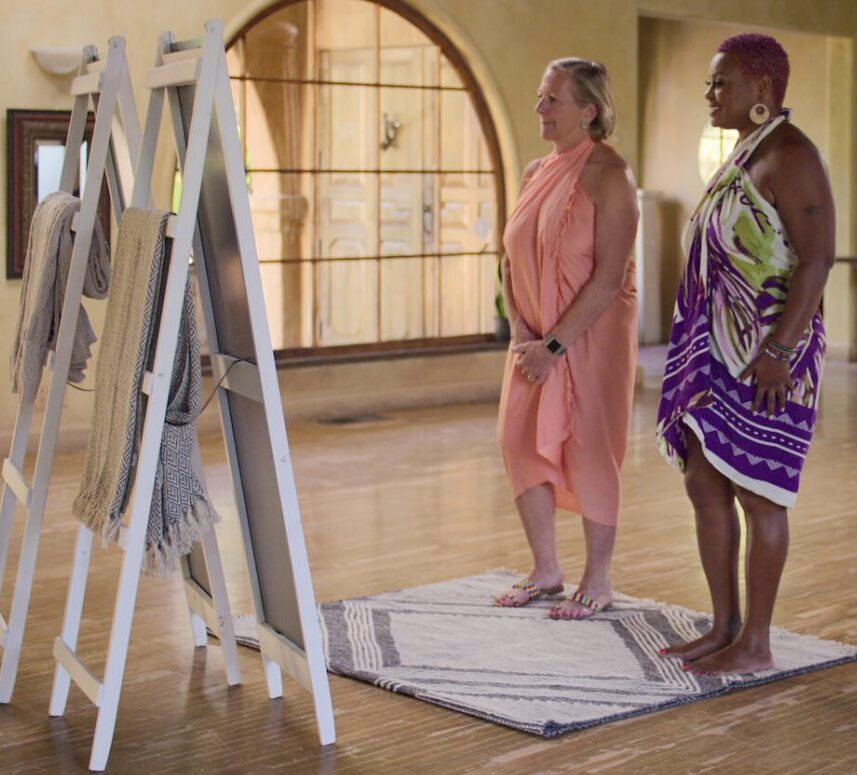 We hear media condemning, addressing it every day, but the show introduces tools to overcome them. In the third episode we see three women in front of a mirror looking at their naked bodies, doing ‘mirror work’: intimacy coach Amina, a queer woman Camille, and an older Joie. It is important for us women to hear other women say: “There are a lot of messages that we have taken in since as girls, women, telling us what our bodies were supposed to look like”; “What we don’t like and what we do like is coming from somebody else telling us: this equates to desirability. Yes, we all want to be desirable but whose voice is that?”; “We’re holding ourselves to some other standard that’s been prescribed to us and it’s very external as opposed to internal.”
We hear media condemning, addressing it every day, but the show introduces tools to overcome them. In the third episode we see three women in front of a mirror looking at their naked bodies, doing ‘mirror work’: intimacy coach Amina, a queer woman Camille, and an older Joie. It is important for us women to hear other women say: “There are a lot of messages that we have taken in since as girls, women, telling us what our bodies were supposed to look like”; “What we don’t like and what we do like is coming from somebody else telling us: this equates to desirability. Yes, we all want to be desirable but whose voice is that?”; “We’re holding ourselves to some other standard that’s been prescribed to us and it’s very external as opposed to internal.”
We need to hear all that and more often. We need to hear it for each message we get every day on how we should look. Have you ever counted the images we are exposed to every day, the comments on our weight, on our skin, on our hair, on our looks and shape? They come in thousands. It is also important to send out a message that there are techniques and tools to overcome this. Most clients who approach me are aware of it but see no way out. How much does Gwyneth Paltrow’s statement resonate with what I experience everyday: “I don’t think I’ve ever met a woman that feels completely great about her body, and that’s a real shame”.
Sex Love & Goop is about connection.
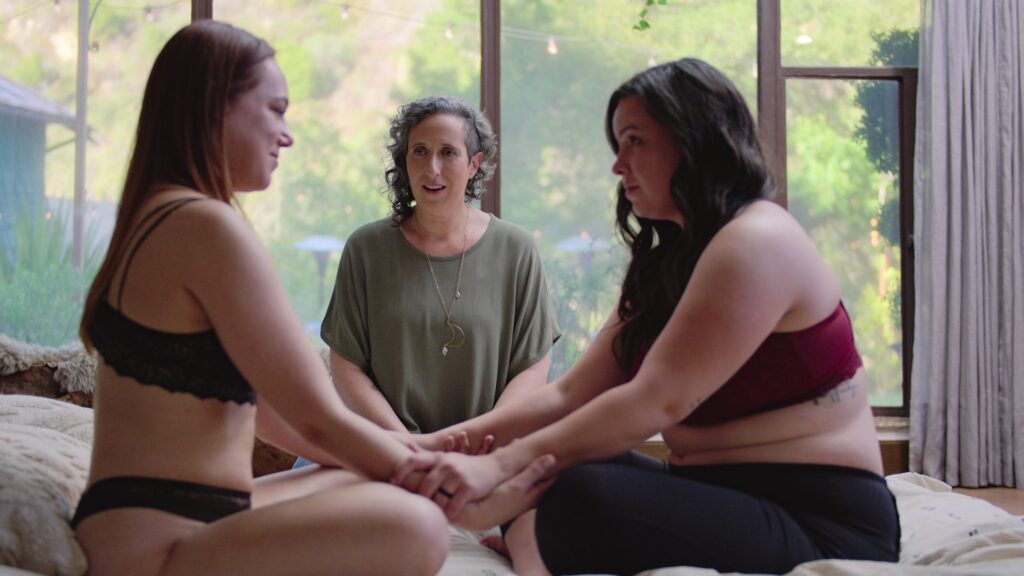 Sex Love & Goop is about connection. Intimacy expert Boehm explains while coaching Felicitas and Rama, a couple trying to reignite their sexual spark; “When trauma patterns of rejection, pain enter the body, the body can freeze. At that point there is no real connection possible.” Connection is not just about sex. It’s not only about your romantic relationships either. Connection is vital with your friends, family, and colleagues.
Sex Love & Goop is about connection. Intimacy expert Boehm explains while coaching Felicitas and Rama, a couple trying to reignite their sexual spark; “When trauma patterns of rejection, pain enter the body, the body can freeze. At that point there is no real connection possible.” Connection is not just about sex. It’s not only about your romantic relationships either. Connection is vital with your friends, family, and colleagues.
If you freeze during a meeting or shut down with your friends, you lose connection. Boehm explores connection through helping the couple challenge their typical roles and responsibilities in their married relationships, through role play and blindfolded play. Play is so important to connect and bond with others, but we so often forget about it because we are busy in our achievement focused lives, busy being productive and responsible. Sex Love & Goop is a call out to play.
Sex Love & Goop is about the many layers of trauma.
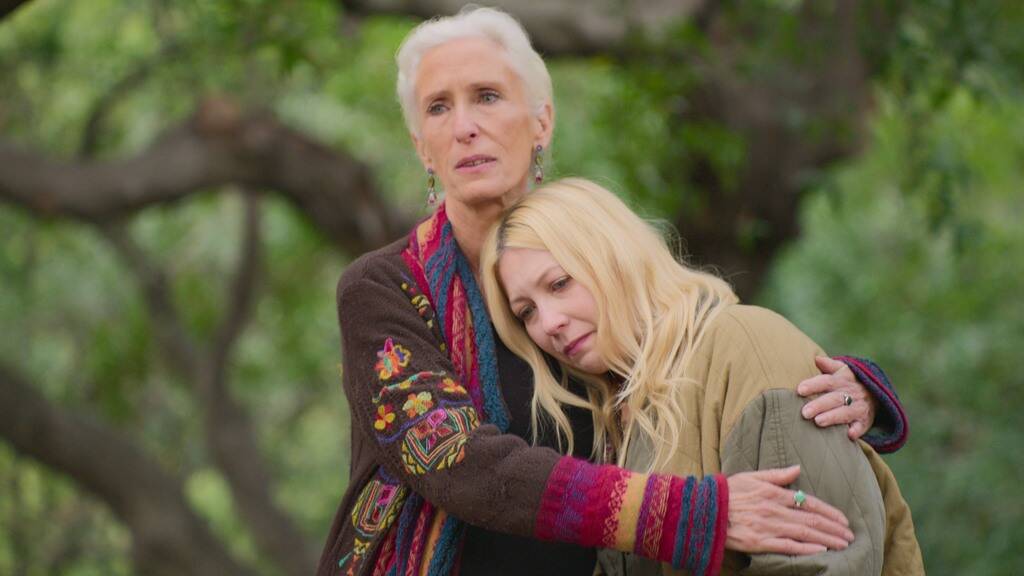 We now can at least imagine that trauma is passed on from generation to generation. Perhaps it’s not science yet but so aren’t many beliefs we have about the world. What if trauma travelled through our DNAs? What if the baggage of our ancestors has an impact in how we experience the world today? Episode five gives us hope. Family constellation therapy expert Katarina Wittich takes us through the beautiful journeys of Dash and Sera. Their understanding of relationship patterns and imprints coming from their families is fascinating. The idea that you can either rebel against those traits or repeat them is not new in therapy. But being able to examine what your parents and grandparents did and felt from as an observer’s point of view is truly healing, and kind of new. It builds compassion for your family instead of resentment. Something that alternative healing and spiritual practices are much better at, as compared to psychotherapy. People need to hear about alternative therapies because only psychotherapy doesn’t really do it for everyone always. It’s important that we expand our horizons and reach out to all the possibilities available. This is how we as a species have evolved: reaching out to new ideas, discarding the ones that don’t work and learning about ourselves.
We now can at least imagine that trauma is passed on from generation to generation. Perhaps it’s not science yet but so aren’t many beliefs we have about the world. What if trauma travelled through our DNAs? What if the baggage of our ancestors has an impact in how we experience the world today? Episode five gives us hope. Family constellation therapy expert Katarina Wittich takes us through the beautiful journeys of Dash and Sera. Their understanding of relationship patterns and imprints coming from their families is fascinating. The idea that you can either rebel against those traits or repeat them is not new in therapy. But being able to examine what your parents and grandparents did and felt from as an observer’s point of view is truly healing, and kind of new. It builds compassion for your family instead of resentment. Something that alternative healing and spiritual practices are much better at, as compared to psychotherapy. People need to hear about alternative therapies because only psychotherapy doesn’t really do it for everyone always. It’s important that we expand our horizons and reach out to all the possibilities available. This is how we as a species have evolved: reaching out to new ideas, discarding the ones that don’t work and learning about ourselves.
Sex Love & Goop is about communication, the importance of letting the other person know who we really are and what we like, or dislike.
 It’s sounds so simple yet so hard. In the last episode, Gwyneth Paltrow recollects talking to her friends about their comfort level in asking for something and recalls: “Almost no one at the table felt comfortable asking for something even if they were in a really healthy relationship, where they felt really safe with the person.” Boehm replies to that with: “Setting boundaries it’s like a workout”.
It’s sounds so simple yet so hard. In the last episode, Gwyneth Paltrow recollects talking to her friends about their comfort level in asking for something and recalls: “Almost no one at the table felt comfortable asking for something even if they were in a really healthy relationship, where they felt really safe with the person.” Boehm replies to that with: “Setting boundaries it’s like a workout”.
I know it is hard work from personal and professional experience. Every day I go through basics of communication and boundaries with clients because it just seems too difficult to express what we want, to someone we love. The episode touches upon sexual communication, but the tools used can, and are, applied to communicating feelings or professional communication too: say what you like and don’t, express how things make you feel, give feedback.
Sex Love & Goop is also about the export of Indianness to white privileged Los Angeles.
 Sex Love & Goop is also about the export of Indianness to white privileged Los Angeles. While training in this predominantly white LA environment, and while watching Love, Sex & Goop episodes unfold, I was wondering what Indian women feel about people calling their genitals yonis. In the series most coaches, and even a character, have Indian names: Jaiya, Amina, Darshana, Ramayana. The LA bubble has really imported the best from India: breathing techniques, tantra, yoga, names, and the magic box of holistic practices Indian sages have been composing for millennia. It often makes me giggle seeing a bunch of white Americans greeting each other with namastes on a Zoom call but this is the 21st century, everything is everywhere, and shouting cultural appropriation is going to spread practices even further.
Sex Love & Goop is also about the export of Indianness to white privileged Los Angeles. While training in this predominantly white LA environment, and while watching Love, Sex & Goop episodes unfold, I was wondering what Indian women feel about people calling their genitals yonis. In the series most coaches, and even a character, have Indian names: Jaiya, Amina, Darshana, Ramayana. The LA bubble has really imported the best from India: breathing techniques, tantra, yoga, names, and the magic box of holistic practices Indian sages have been composing for millennia. It often makes me giggle seeing a bunch of white Americans greeting each other with namastes on a Zoom call but this is the 21st century, everything is everywhere, and shouting cultural appropriation is going to spread practices even further.
I am also a white person coaching people in India on how to achieve better intimacy. Bringing back a repackaged version of what was ‘Indian’ in the first place. I acknowledge my privilege and cultural appropriation in each session I conduct. I would like to live in a world of no boundaries for yonis and namastes but here I am making fun of it. I get a lot of criticism and people saying: “You can do this in India just because you are white” but as Jiya candidly mentions at the end, seeing clients grow and come out of their shame is what makes everything worth it, even the criticism and judgements.
Watch Sex Love & Goop if you want to find out what I do at The Intimacy Curator


